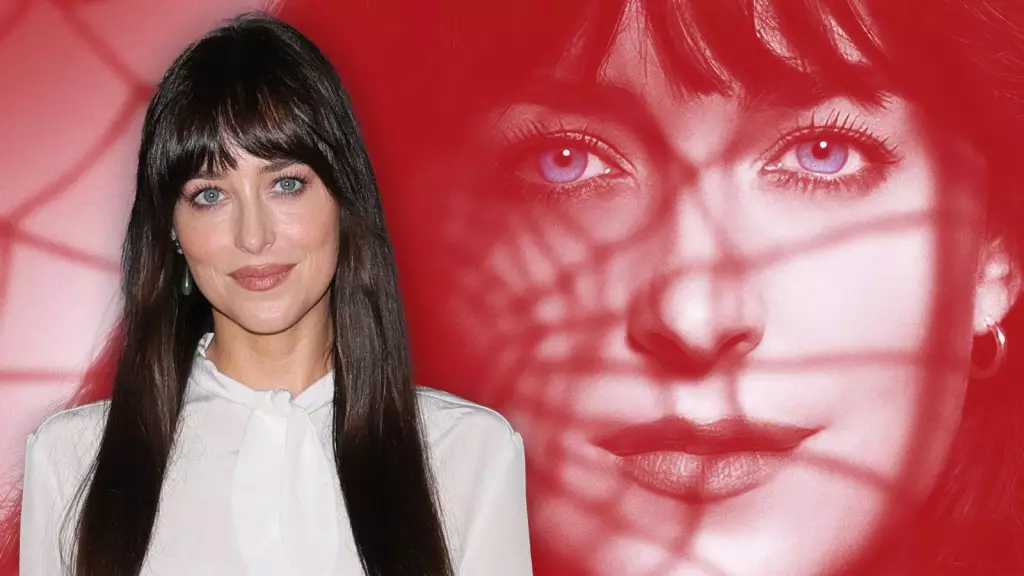In a cinematic universe dominated by towering budgets and sprawling franchises, the specter of superhero movie fatigue is looming larger than ever. In a candid interview, Dakota Johnson, the lead of the ill-fated “Madame Web,” offers an unsettling glimpse into the complexities that plague modern filmmaking. Amid rising concerns about the viability of such films, Johnson’s observations touch on deeper issues that resonate beyond the realm of petty box office numbers—issues that challenge the very essence of creativity in Hollywood.
The Perils of Committee Decisions
Johnson astutely points out a significant pitfall of contemporary filmmaking: the tendency for creative choices to be dictated by non-creatives. She asserts, “There’s this thing that happens now where a lot of creative decisions are made by committee.” The implications of her statement are profound; it suggests that the artistic vision is often compromised in favor of box office metrics or market research—a dance that ultimately sacrifices authenticity for profit. In fields where innovation and emotional resonance reign supreme, an assembly line approach can render the final product lifeless and unengaging.
The crux of the matter is that art should stem from a genuine place of inspiration, yet the commodification of cinema often stifles individuality. Johnson’s frank acknowledgment of her lack of control during the filmmaking process illuminates a troubling reality: even established stars can feel like mere cogs in a massive entertainment machine. It raises a vital question—how many unique narratives are stifled by long meetings and power plays among studio executives?
A Star’s Revelation
In her dialogue with “Bustle,” Johnson reflects on her experience with “Madame Web,” hinting at a painful realization that she may not fit into the superhero genre. “I had never done anything like it before. I probably will never do anything like it again because I don’t make sense in that world. And I know that now,” she confesses. This striking admission underscores a critical tension in an industry obsessed with genre—actors often find themselves in roles that clash with their artistic identity.
What makes Johnson’s perspective so compelling is her acceptance of the unexpected lessons gleaned from her experience. She articulates the unpredictable nature of filmmaking, positing that sometimes projects evolve beyond initial intentions, leaving cast and crew bewildered. Yet, rather than wallowing in disappointment, her attitude embodies a resilience that serves as a reminder of the continual learning curve inherent in any creative pursuit.
The Role of Critics in Artistic Reception
Amidst the fallout surrounding “Madame Web,” Sony Pictures CEO Tony Vinciquerra’s comments further embellish this narrative, as he contended that the film suffered at the box office largely due to harsh criticism. Such a perspective invites scrutiny—how much influence do critics wield over public opinion? Vinciquerra’s assertion that “the press just crucified it” sparks a dialogue about the responsibility of critics to engage thoughtfully rather than destructively. He compares “Madame Web” to “Venom,” which fared poorly with critics but thrived through audience embrace. This dichotomy illustrates a disconnect: the intentions and reactions of those who create do not always align with audience desires or critical reception, often resulting in confusion.
Critics serve an important function in guiding audience expectations, but their role can also act as an anchor on innovative storytelling. While favorable reviews can propel a lesser film into popularity, venomous critiques can bury a potentially enjoyable project unseen. Herein lies an urgent need for a more balanced and constructive approach by critics—a demanding yet rewarding challenge that, if met with integrity, could enrich the artistic landscape.
The Future of Superhero Cinema
As Hollywood inches forward, the insights from Dakota Johnson and industry leaders like Vinciquerra could serve as a cautionary tale. The case of “Madame Web” illustrates the precarious balance between creative autonomy and corporate oversight in an industry increasingly defined by financial metrics rather than artistic merit. If filmmakers and studios wish to sustain the superhero genre, a shift towards prioritizing creative integrity alongside profitability is essential. Only then can audiences receive narratives that resonate—capturing hearts rather than merely filling seats.
In the increasingly turbulent waters of filmmaking, Johnson’s reflections reveal an urgent narrative yearning for change: a return to artistry and intuition that fosters storytelling rather than suffocates it under the weight of commercial interests. The path ahead may be fraught with challenges, but illuminating voices like Johnson’s can spark insightful debates essential for the evolution of cinema.
